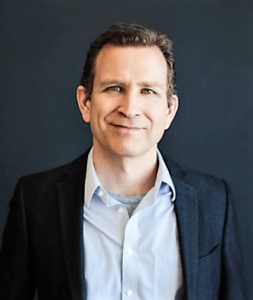Bruce Gregory Friedrich, Executive Director of The Good Food Institute and founding partner of New Crop Capital, talks about the role of faith in inspiring his concern for animals, the amazing developments in the ethical food industry and his vision of making sustainable and humane food choices; the default choice.
 For how long have you been vegan and did your faith motivate your decision to become one?
For how long have you been vegan and did your faith motivate your decision to become one?
I adopted a vegan diet in 1987, when I read Diet for a New America and realized that eating meat wastes resources and contributes to global poverty through its gross inefficiency. I talk about that in the first video in the resources section of GFI.org. My faith is the entire reason I became vegan in 1987, yes. I felt that my faith required that I not contribute to the suffering of people around the globe, and consuming animal products does that. My faith also brought me to animal protection work in 1996, which I see as a critical aspect of a life devoted to following Jesus.
Are there any specific Christian people, books or sources which first inspired your concern for animals?
Andrew Linzey is the reason I went from running a homeless shelter, which I did from 1990-1996, to working for PETA, which I did from 1996-2011. His writing, especially in the book Animal Theology, is just superb. I cannot recommend it highly enough. I’m also a big fan of the faith-based work of Matt Halteman, Charlie Camosy, and Sarah King, the co-founder of CreatureKind, where I’m an advisor.
Tell us about The Good Food Institute
Studies consistently show that the primary factors in any consumer’s eating choices are taste, price, and convenience. In order to compete with animal products based on the factors that actually guide consumer choice, the Good Food Institute is focused on working to make plant-based and “clean” (i.e., grown in a culture without live animals) meat, dairy, and eggs as delicious, price-competitive, and convenient as possible. We are taking ethics off the table for consumers by making the sustainable and humane choice the default choice.
 Can you tell us more about “clean meat,” and do you see this as playing an important future role in re-evaluating our eating habits?
Can you tell us more about “clean meat,” and do you see this as playing an important future role in re-evaluating our eating habits?
Clean meat is meat produced without animal slaughter. Rather than growing muscle tissue on live (and often crowded and filthy) animals, producers take a few pig or chicken or cow cells and use sugars to grow those cells into muscle tissue – all in a clean factory setting. As a result we get meat with no antibiotics, growth hormones, E. coli or salmonella, and no waste contamination – all of which come standard in conventional meat production. We explain the process here, and there are a lot more resources in the resources section of GFI.org.
Have plant-based meat alternatives improved over the years and has this been a factor in the rise of meat-free diets?
They are getting better and better, and I think we’re going to see them get better still. I suspect that rather than fully meat-free diets, we’re going to see more and more people consuming more and more plant-based and clean meat (i.e., meat produced in a culture without animal slaughter). Just like 90 percent of plant-based milk consumers also drink animal-based milk, I think our goal should be to convince everyone to eat less meat and more plant-based meat, even if they are not willing to cut out meat entirely.
Bruce Friedrich is Executive Director at the Good Food Institute. He graduated magna cum laude from the Georgetown University Law Center and Phi Beta Kappa from Grinnell College, and also holds degrees from Johns Hopkins University and the London School of Economics. Bruce has held leadership roles for the past two decades at top nonprofit organizations working to reform animal agriculture. Bruce is co-founder of New Crop Capital, a venture capital fund that invests in plant-based and “clean” (i.e., cultured) alternatives to animal agriculture, as well as tech platforms that advance plant-based eating.




